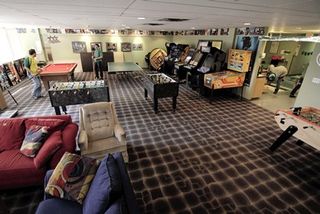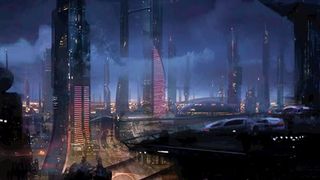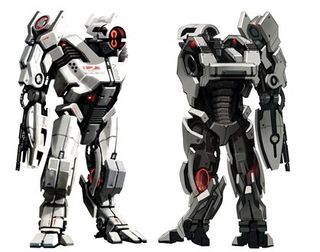The Making of Mass Effect 2
How BioWare built a better space opera
“The mining?” asks BioWare dev Christina Norman, “everyone hates the mining.” Yep, the mining was Mass Effect 2’s one mistake, and even then it was a small one, made worse by the sheer bloody amount of probing you had to do just to become competitive. In every other way Mass Effect 2 was an improvement on its predecessor, but it took a series of gutsy decisions to take it in its brand new direction.

Above: BioWare's office
“In Mass Effect 1 we had a successful game,” Norman – ME2’s Lead Gameplay Designer – explained to us. “What do you generally expect in a sequel to a successful game? Usually, you’d expect polish and building on a lot of the features that were already there, but we did something radical with Mass Effect 2.” Where Mass Effect was what Norman calls an ‘action RPG’, ME2 is an all-out shooter RPG and has left a handful of forumites complaining that BioWare had stripped the RPG out of Mass Effect altogether. “We had thread titles like ‘Mass Effect 2 is not an RPG’ and ‘BioWare ruined Mass Effect’ on our forums. It was a small percentage but we noticed,” says Norman. “But we forgot labels and made a great game. Forget about shooter and RPG balance. Let’s just make a great game.”
The changes started with the combat system. Norman’s team turned the RPG systems off completely and spent 81 calendar days tuning how combat would work in Mass Effect 2 using the original Mass Effect as a foundation. In the first outing, careful aiming was largely irrelevant – if your crosshair was over a character the game would do some RPG math and work out if you had scored a hit or not. For the sequel, combat was overhauled with some specific goals in mind – it had to be playable in real time without any need to pause, cover had to matter, and weapons had to be useful from the moment you picked them up without ever needing to level up.

Norman explains, “We decided to build shooter combat first – not in priority, but in order – it needed a lot of improvement and BioWare aren’t experts on shooter combat. By focusing on it first we figured we’d remove a lot of uncertainty about other features. We wanted more satisfying combat and a big part of that is making weapons more accurate and powerful at level one – basically saying ‘let’s take the RPG out of the shooter.’ We look like a shooter so that aspect of our combat should play like a shooter.”
“I wouldn’t say that ME2’s combat system is radically different,” says Project Director Casey Hudson. “It’s still a third-person shooter with the ability to give orders to two squad mates. What’s really different is the overall feel and quality of combat, but that results from a series of small changes versus a wholesale, radical redesign and the result is something that plays so much better that it actually does feel like a radical change.

“One of the most controversial changes to the combat was probably how ammo works,” Hudson goes on. “It was something that wasn’t part of the main game design but instead was implemented as a test by a gameplay programmer. The Lead Designer was against the idea, but tested the ‘ammo’ version of the game for several weeks in total secrecy before concluding that it made a huge improvement to the tension and pacing of combat. Then when he pitched it to me, I was against it until I played it for a while and was convinced as well. Some of the best ideas in ME2 happened that way, where a passionate member of the team took their own time to try something they thought would be great, and it eventually passed harsh scrutiny to become part of the experience.”
Sign up to the GamesRadar+ Newsletter
Weekly digests, tales from the communities you love, and more
Norman has a number of obvious reasons for the change to the ammunition – speed, pacing, making it more like other shooters – but there are reasons which aren’t so obvious. In Mass Effect 1, bullets were ‘free’ which led to players running down corridors holding the trigger down in the hopes of scoring a single lucky hit – sure, they wouldn’t score many hits but they had nothing to lose by it either – which led to some pretty silly combat scenarios.

Similarly, Mass Effect 2 abandons individual recharge times for biotic powers in favour of a unified system so players can’t spam lengthy chains of biotic powers – something which made the combat ridiculous and the endgame easy. Those controls changed, too, specifically aiming to match other shooters to make the experience feel natural and immediate. But if BioWare’s team thought fiddling with combat would be controversial, their inventory overhaul would be considered a slap in the face by RPG fans of old.
Most Popular



